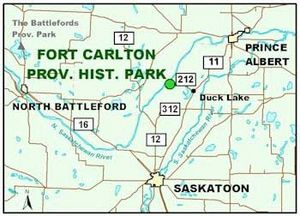Fort Carlton facts for kids
Quick facts for kids Fort Carlton |
|
|---|---|

Exterior view of Fort Carlton's palisades
|
|
| Location | RM of Duck Lake No. 463, Saskatchewan, Canada |
| Built | 1810 |
| Original use | Trading post |
| Demolished | 1885 |
| Rebuilt | 1967 |
| Current use | Historic site/museum |
| Owner | |
| Official name: Carlton House National Historic Site of Canada | |
| Designated: | 1976 |
| Lua error in Module:Location_map at line 420: attempt to index field 'wikibase' (a nil value). | |
Fort Carlton was a very important place for trading furs from 1795 to 1885. It was run by the Hudson's Bay Company, a famous trading company. The fort was located along the North Saskatchewan River in what is now Saskatchewan, Canada.
Today, Fort Carlton has been rebuilt by the government of Saskatchewan. It is now a provincial historic park that you can visit. It's about 65 kilometers north of the city of Saskatoon.
Contents
Fort Carlton's Story
The place we call Fort Carlton actually refers to several forts. These forts operated at different times and in three different spots. The first two forts were built in 1795 and 1805. A series of forts named Fort Carlton then operated at a third location starting in 1810.
Where Fort Carlton Was Built
- The first Fort Carlton (1795–1801) was built in a safer area. This was after another trading post, South Branch House, was destroyed. It didn't trade many furs and closed in 1801. The North West Company (NWC), another fur trading company, had a nearby post called Fort St. Louis.
- The second Fort Carlton (1805–1810) was built on the South Saskatchewan River. Both the Hudson's Bay Company (HBC) and the NWC had posts there. In 1810, both companies moved their operations. They went to the third and most important Fort Carlton location.
- The third Fort Carlton (1810–1885) was built on the south bank of the North Saskatchewan River. This spot was known as the Great Crossing Place, where people could cross the river. Even though the area was mostly prairie (grasslands), there were forests nearby. These forests provided wood, and there was even limestone for building.
At first, the NWC had its Fort La Montée inside the same walls as the HBC's Fort Carlton. In 1816, the NWC moved its fort to a different spot. When the two companies joined together in 1821, Fort La Montée was closed.
Over the years, the buildings at Fort Carlton needed repairs. So, new forts were built a few times in slightly different spots nearby. By the mid-1800s, Fort Carlton became a key stop for mail delivery in winter. People from different parts of Canada would meet there to exchange letters.
In 1869, there was a serious smallpox sickness that affected many people. Steamboats started arriving on the Saskatchewan River in 1874, changing how goods and people traveled. The last fort at this location burned down in 1885.
Trading at Fort Carlton
Fort Carlton was mainly a place to trade for supplies. These supplies included pemmican, which was a food made from dried meat, and buffalo robes. Other animal furs were also traded there.
The fort was a major hub for the Hudson's Bay Company in the Saskatchewan area. It was located on the Carlton Trail, an important route for travelers. This trail connected the Red River Colony (in today's Manitoba) to Fort Edmonton (in today's Alberta). Fort Carlton was a vital stop for anyone traveling along this trail.
Fort Carlton's Role in History (1880–1885)
An important agreement called Treaty Six was first discussed near Fort Carlton in 1876. This treaty was between the Canadian government and various Cree and Saulteaux First Nations groups.
Later, in the 1880s, the North-West Mounted Police (who are now the RCMP) used Fort Carlton as their main base. This was in the Saskatchewan Valley region.
During the North-West Rebellion in 1885, the police left the fort. It was then briefly taken over by Gabriel Dumont's Métis forces. However, the Métis soon moved to Batoche. During this conflict, the fort was sadly destroyed by fire.
Fort Carlton Today
Fort Carlton was rebuilt in 1967, bringing its history back to life. In 1976, it was named a National Historic Site of Canada. This means it's a very important place in Canadian history.
The site shows what the fort looked like around 1880. It has four replica buildings built in a style called "Red River frame." In 1986, the area around the fort became a provincial park of Saskatchewan. It's a great place to learn about the past!
More to Explore
- Saskatchewan River fur trade
- List of protected areas of Saskatchewan
- Tourism in Saskatchewan
- History of Saskatchewan
 | Isaac Myers |
 | D. Hamilton Jackson |
 | A. Philip Randolph |


